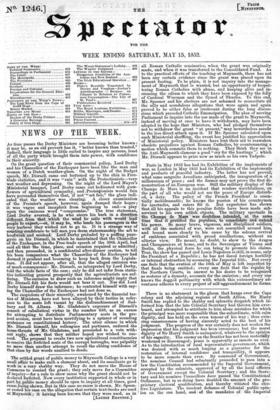The settled grant of public Money to Maynooth College is
a very small affair to make such a clamour about, and its assailants go to work in a very shabby way. They do not move the House of Commons to rescind the grant ; they only move for a Committee of inquiry-for a rule to show cause why the grant should not be declared forfeited. Now every institution supported in whole or in part by. public money should be open to inquiry at all times, good cause.being shown. But in this case no cause is shown. Mr. Spoon- er rested his ease on the allegation that certain text-books are used at Maynooth ; it having been known that they were used, as in
all Roman Catholic seminaries, when the grant was originally made, and when it was transferred to the Consolidated Fund. As to the practical effects of the teaching at Maynooth, there has not been any certain evidence since the grant was placed upon its present footing. To be plain, it is not inquiry into the manage- ment of Maynooth that is wanted, but an opportunity of bespat- tering Roman Catholics with abuse, and keeping alive and in- creasing the odium to which they have been exposed by the folly of Cardinal Wiseman and the Synod of Thurles. To this end., Mr. Spooner and his abettors are not ashamed to resuscitate all the silly and scandalous allegations that were again and again proved to be either false or irrelevant during the long discus- sions which preceded Catholic Emancipation. The plan of moving Parliament to inquire into the use made of the grant to Maynooth, instead of moving at once to have it withdrawn, may have been adopted in the hope that -Ministers, who had pledged themselves not to withdraw the grant "at present," may nevertheless accede to the less direct attack upon it. If Mr. Spooner calculated upon • such Ministerial shuffling, the event has justified his appreciation , of Ministerial policy.' Ministers have lent their aid to reawaken 1-obsolete prejudices against Roman Catholics, by countenancing a motion which commits them to nothing. They think they see in the Anti-Maynooth clamour a good "cry for the hustings " ; which Mr. Disraeli appears to prize now as much as his own 'Tadpole.


























